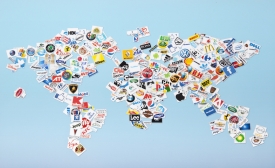china
The story of China is well-known. China has achieved a remarkable economic growth lifting its country out of poverty. It presents itself as an economic model to the Global South, an alternative to one with liberal democratic political infrastructure. However, its rise on the world stage has not been supported by a commensurate positive national image.
While the world of business is increasingly connected and integrated on the global scale, the nationality of a brand at times attains growing political significance in today’s marketplace. Some argue that with globalization a brand’s nationality—its perceived national association—has become so tenuous that contemporary consumers may not care where a brand is from or even know the country-of-origin information of the brands they purchase.

Jay Wang on the growing ambiguity of the "Made in" label.
The match also represented something else: a case study in the globalization of European soccer, with a decidedly Chinese flavor. Both teams were acquired in 2016 by Chinese investors for a total exceeding $1 billion, a capstone to a flurry of Chinese purchases of European soccer clubs over the past two years. [...] China’s big soccer play is of a piece with Chinese President Xi Jinping’s “Chinese Dream” idea of attaining national greatness
It was a regular Friday in the U.S. but the most special day of the year in China and other Asian communities. The Cleveland Cavaliers paid tribute to their Chinese fans by celebrating Chinese New Year, educating and engaging local fans with Chinese culture. This was the second annual celebration for the Cavs and the NBA's sixth year with official organized events.
The American withdrawal from the Trans-Pacific Partnership trade agreement has opened the door to China to try and strike a pose as the leading defender of liberalized trade and globalization. The public face of this new push is none other than China’s president. This month, Xi became the first Chinese president to speak at the World Economic Forum in Davos where he set forth the case for continuing to expand global trade.
With six million Chinese tourists expected to travel abroad over the Lunar New Year break, China’s Jan. 27 to Feb. 2 holiday is crucial for Taiwan tour agency operator Li Chi-yueh, who relies on mainland visitors for a third of his revenue. [...] Though Tsai says Taiwan wants peace with China, Beijing suspects she seeks formal independence. “China uses its sightseeing tourists as a diplomatic weapon,” said Li.
The 1,860.5 kilometer-long Tazara railway spanning from Tanzania's commercial center Dar es Salaam to Zambia's Central Province represents one of China's largest foreign aid projects. A tripartite agreement was signed in September 1967 to build the railroad and construction began in 1970. The railway opened in 1975 and in July 1976 was officially transferred to the governments of Tanzania and Zambia, with the Tanzania-Zambia Railway Authority undertaking operations.







